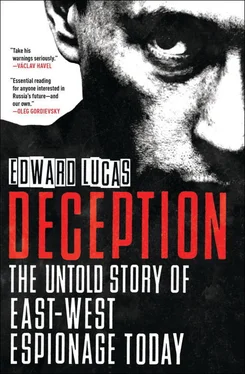The episodes I have chosen to illustrate these problems are linked to the Baltic states of Estonia, Latvia and Lithuania. These have been vulnerable and contested territory on the East–West frontline for a hundred years. Even today, they stand most to gain if we win – and most to lose if we are defeated. I make no secret of my sympathy for their cause. I lived there in 1990–94 when they wriggled out of the Kremlin’s clutches. I witnessed their growing prosperity and rejoiced over what seemed like their safe landing in NATO in 2004. I have also seen how Russia systematically tries to undermine their sovereignty and subvert their security. The tales of the spy wars there include torture and treachery, deep deceptions and cynical double-dealing. They feature tragedy and triumph, brilliance and bungling, heroism, sacrifice, betrayal – and deception.
The first episode comes in the months after the Russian revolution of 1917, when outside governments, chiefly Britain, France and the United States, believed that they could snuff out the communist experiment before it took root and spread to other countries. The British envoy in Moscow, Robert Bruce Lockhart, fell for a brilliant deception operation personally masterminded by the Bolshevik leader, Vladimir Lenin. Lockhart believed Lenin’s bodyguards – a crack force of Latvian riflemen – would switch sides in return for the offer of an independent Latvian state, backed by the Western powers. But having failed to check properly the credentials of his supposed Latvian allies, Lockhart was hooked by Lenin’s ruse. The British agent’s naivety and carelessness not only landed him in jail. It also confirmed Russian suspicions about Western meddling, and fuelled Lenin’s propaganda machine, which was warning Russians of foreign meddling and menaces. Catching a British spy red-handed trying to mount a putsch was the best possible proof of that.
Despite that humiliating lesson, Western intelligence in the region then fell victim to a far greater deception: the ‘Trust’. British spymasters’ gullibility and recklessness in the early 1920s allowed the Cheka, the forerunner of the KGB, to pretend that a huge underground organisation in Soviet Russia was eager to receive outside help. Nothing of the kind existed: the Trust was an invention. Scores of anti-communist Russians went to their deaths on botched operations planned by Western spy chiefs who believed triumph was just around the corner. This fiasco also cost the life of Britain’s reckless ‘ace of spies’, Sidney Reilly. His successors proved to be the epitome of the secretive incompetence that plagues the world of espionage. They proved unwilling or unable to learn from their mistakes, making a similar blunder only twenty years later when they backed bogus anti-Soviet resistance groupings in Estonia, Latvia and Lithuania. British, American and other Western spymasters saw these countries as ideal springboards for both spying and subversion: the Soviet-occupied Baltic states were easily accessible by plane or boat, with ardently anti-communist populations that were already fighting a guerrilla war against their new Soviet rulers. But the result was a catastrophe. The brave men that we sent to help this cause ended up in the clutches of the KGB.
I have tracked down perhaps the last survivor of those days. He is living peacefully in southern England, cherishing medals awarded by a country he thought would not be free in his lifetime, and a statuette given in belated gratitude by SIS. I have also found a previously unpublicised example of a successful mission in the Soviet Union by a star British spy and traces of others. But the balance sheet is still grim. The spy chiefs’ deluded belief in partisan warfare in the Baltic cost hundreds of lives and ruined thousands. It squandered money, prestige and credibility on a cause that brought no gain and great pain.
The latest blunder came when the Baltic states regained independence in 1991, and Western intelligence piled back in to its old stamping ground. Again, the Russians were waiting and again the West was caught in a deception. Herman Simm, the most trusted official in the most trusted of all the ex-communist countries, Estonia, was a linchpin between its defence ministry and foreign allies. He gained plaudits for his efficiency and helpfulness, and top Estonian and NATO security clearances. The people who administered these systems somehow failed to spot that the avuncular ex-policeman was a long-standing KGB agent. To Estonia’s lasting credit, it did not try to hush up the catastrophe: Simm was caught, prosecuted and jailed. Not only that, the Estonian authorities gave me exclusive and repeated access to him. One reason for Estonian sensitivity is a startling and little-known aspect of the story. Simm was not spying only for the Russians.
Simm was an exception because he was caught. So too were Ms Chapman and the spies in America. But their story reveals the long-term efforts Russia makes and the vulnerabilities it exploits. How many other ‘illegals’ are living unnoticed in Britain, Europe or America? And how many agents have they recruited? Raising the alarm over this is a central aim of this book. The West has largely let down its guard. The CIA’s counter-espionage officers and their counter-intelligence colleagues [8] h An arcane distinction is sometimes drawn between counter-espionage (active and offensive measures, such as distracting, impeding, expelling or recruiting the officers of a hostile foreign service) and counter-intelligence (more general preventative measures such as screening and surveillance, aimed at finding leaks and plugging them).
at the FBI still devote time and money to catching Russian spies. But this is the exception, not the rule. Since 11 September 2001, priorities have shifted. Britain’s Security Service, usually known by its acronym MI5, claims to devote only 4 per cent of its resources to counter-intelligence – the overwhelming majority goes to counter-terrorism. 17In Belgium a mere handful of local spycatchers, ill-paid and lacking political backing, have to keep track of the hundreds of Russians aiming to penetrate the European Union, the NATO headquarters in Brussels and other tempting targets.
The passage of time and other priorities have eroded the expertise and institutional memory that in Cold War days helped spycatchers keep track of Soviet penetration attempts. Concerns for privacy have made vetting procedures flimsy. Officials can make money on the side, take lucrative jobs on retirement, take unexplained foreign trips, copy documents onto memory sticks from supposedly secure laptops and carry an array of electronic gadgets that never come under scrutiny. I also highlight the mistaken complacency that has surrounded the expansion of NATO to the ex-communist countries. It was right to enlarge the alliance (chiefly because of Russia’s neo-imperialist sabre-rattling) but intelligence and security services have grossly underestimated the Soviet-era shadow that still lies over the region. The liberation of 1989–91 was intoxicating, but its effects were only skin-deep. Replacing the planned economy with free markets, state censorship with free media, and one-party rule with free elections were hugely important changes. But the transformation of the political and economic systems could not be matched by an instant change in the human beings that inhabit them. Millions of people in the region have grown up under communism and collaborated with it. The toxic legacy of secret police files, with the shabby compromises and sordid secrets they contain, still taints public life. It provides plenty of scope for blackmailing the guilty – and smearing the innocent. Even those seen in the West as heroes, such as Poland’s former president Lech Wałęsa, have come under a cloud of suspicion about past collaboration. 18Although not everything in the secret police files is true, and many true things are not in the files, the dirty secrets of the past, many of them spirited away to Russia in the dying days of the old regimes, create great possibilities for pressurising anyone born before, roughly, 1970. In short, the collapse of communism left a series of human time-bombs all over the former empire – with the Kremlin in charge of the remote controls.
Читать дальше












